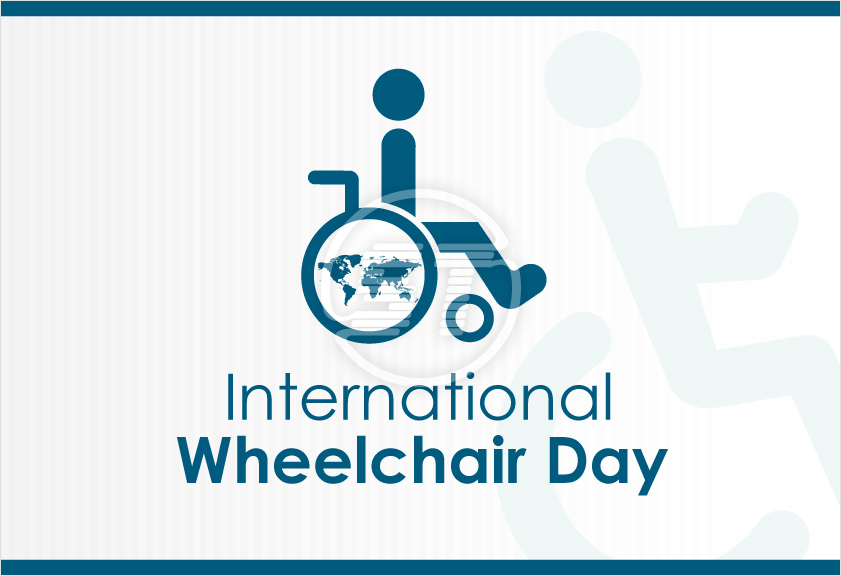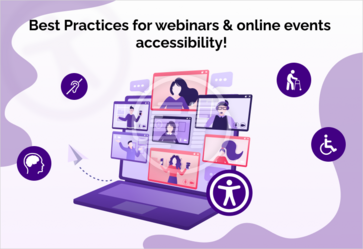“Technology is best when it brings people together.”
Yes, technology is meant to gather the world in an organized environment and make their lives easier by helping them to perform essential activities simply and quickly.
In today's fast-paced digital age, accessibility knows no bounds, and by harnessing the capabilities of cutting-edge technology, we can break barriers and pave the way for a more inclusive society.
March 1st is international wheelchair day. It is a day to celebrate the positive impacts of wheelchairs on the lives of individuals who are using them. The celebration started in 2008 and ever since organizations across the world observe the day actively to join this initiative and promote inclusivity. Around 131 million wheelchair users across the world rely on some or other technologies to get around. Out of these numbers, approx. 3 million hails from the United States only.
Join us as we delve into the incredible advancements revolutionizing the lives of individuals with mobility challenges, celebrating their strength, resilience, and the boundless potential of human ingenuity.
Trivial changes matter the most!
Innovations are happening regularly in assistive technologies to benefit everybody including individuals using wheelchairs. For instance, there are devices and software that help people to easily navigate and perform their tasks. Modern wheelchairs are already ergonomic with in-built assistance and when third-party software gets integrated with these smart wheelchairs, nothing like it.
Assistive technologies for wheelchair users are made with in-depth research and utmost precision so that they have capabilities to accommodate differently abled users’ requirements. People with motor disabilities might need assistance in movements, navigating digital content, performing environmental tasks (switching on/off television, lights, or other gadgets), etc. Focusing on each facet of their requirements is crucial to make moderate yet necessary changes in technology.
YOU MAY ALSO LIKE: Web Accessibility Statistics
Assistive technologies that are uplifting user experience!
It is an opportunity to celebrate the advancements in assistive technology that empower individuals using wheelchairs to lead more independent and fulfilling lives. Digital assistive technology plays a crucial role in this empowerment by offering innovative solutions to various challenges faced by wheelchair users. Here's how digital assistive technology can make a difference:
Smart Wheelchairs: Digital advancements have led to the development of smart wheelchairs equipped with sensors, cameras, and AI (Artificial Intelligence) algorithms. These wheelchairs can be controlled using voice commands, head movements, or even eye tracking, providing users with greater autonomy and ease of mobility.
Mobile Apps: There are numerous mobile applications designed specifically for wheelchair users. These apps can help with navigation, finding accessible routes, locating wheelchair-friendly facilities, and even controlling smart devices in the home environment, thereby enhancing convenience and accessibility.
Wearable Devices: Wearable devices such as smartwatches or sensors integrated into clothing can monitor vital signs, track activity levels, and provide alerts for potential health issues. These devices not only promote health and safety but also empower wheelchair users to manage their well-being more effectively.
YOU MAY ALSO LIKE: Video Accessibility
Digital innovations to support International Wheelchair Day!
Digital accessibility plays a significant role in supporting International Wheelchair Day and empowering individuals using wheelchairs in several ways:
Accessible Information: Digital platforms can disseminate information about International Wheelchair Day events, resources, and initiatives in formats accessible to individuals using wheelchairs. This includes providing information in alternative formats such as audio descriptions, captioning, and screen reader compatibility to ensure that everyone can access and participate in related activities.
Virtual Participation: Digital platforms enable individuals using wheelchairs to participate in International Wheelchair Day events virtually, removing barriers related to physical accessibility. Virtual events, live streams, and webinars allow individuals to engage from the comfort of their homes, regardless of geographical location or mobility limitations.
Online Communities and Support Groups: Digital platforms facilitate the creation of online communities and support groups specifically tailored to individuals using wheelchairs. These communities provide a space for sharing experiences, resources, and advice, fostering a sense of belonging and connection among wheelchair users worldwide.
Accessible Transportation Information: Digital platforms can provide accessible transportation information, including wheelchair-accessible routes, public transportation schedules, and ride-sharing services equipped with wheelchair-accessible vehicles. Accessible transportation information enhances mobility and independence for individuals using wheelchairs, enabling them to navigate their communities more efficiently.
Assistive Technology Resources: Digital platforms offer resources and information about assistive technologies designed to enhance the independence and quality of life for individuals using wheelchairs. This includes reviews, tutorials, and guides on using digital assistive devices, apps, and tools tailored to the needs of wheelchair users.
Advocacy and Awareness Campaigns: Digital platforms serve as powerful tools for advocacy and raising awareness about issues affecting individuals using wheelchairs. Through social media campaigns, online petitions, and digital storytelling, advocates can amplify their voices, educate the public, and promote inclusivity and accessibility on International Wheelchair Day and beyond.
Accessible Education and Employment Opportunities: Digital accessibility ensures equal access to educational resources, job opportunities, and professional development initiatives for individuals using wheelchairs. Accessible online learning platforms, remote work options, and digital job recruitment platforms create pathways for education and employment, empowering wheelchair users to pursue their academic and career goals.
YOU MAY ALSO LIKE: Screen Reader Accessibility
Overall, digital accessibility plays a crucial role in supporting International Wheelchair Day and empowering individuals using wheelchairs by promoting inclusivity, connectivity, and equal opportunities in the digital world and beyond.
Skynet Technologies specializes in providing comprehensive and cost-effective website accessibility services including audits, design, development, remediation, consulting, self-assistance training, VPAT accessibility conformance reports, ongoing monitoring, compliance maintenance retainers, and support services. If you are interested in promoting equal access and inclusivity, reach out to us hello@skynettechnologies.com


